| Reviews & Columns |
|
Reviews DVD TV on DVD Blu-ray 4K UHD International DVDs In Theaters Reviews by Studio Video Games Features Collector Series DVDs Easter Egg Database Interviews DVD Talk Radio Feature Articles Columns Anime Talk DVD Savant Horror DVDs The M.O.D. Squad Art House HD Talk Silent DVD
|
DVD Talk Forum |
|
|
| Resources |
|
DVD Price Search Customer Service #'s RCE Info Links |
|
Columns
|
|
|
Forbidden Hollywood, Volume 4
Although Warner Home Video's Forbidden Hollywood series of spicy Pre-Code melodramas and comedies has had a good run going all the way back to the VHS era (heck, I remember spending a hard-earned $20 on a tape of Skyscraper Souls back in the day), there were fears that the introduction of their Warner Archives series of manufactured-on-demand DVDs might spell an end to it. Fear not, however - although scaled down in terms of packaging and bonus content, this latest edition of Forbidden Hollywood still delivers the goods.
The four discs that comprise Forbidden Hollywood, Volume 4 cover a wide variety of stories, including soufflé-light mannered comedy (Jewel Robbery), tense melodrama (Lawyer Man), showbiz/Manhattan tomfoolery (They Call It Sin), and sophisticated soapiness (Man Wanted). They have a remarkable consistency, however, which is due to them all being Warner Bros. pictures from 1932 (the jazzy, economical feel of that studio is all over these). Three of the four are directed by the versatile William Dieterlie, and several actors reappear in more than one film. Headliners like William Powell and the underrated Kay Francis have multiple appearances, along with reliable supporting performers like Helen Vinson, David Manners, Claire Dodd, Una Merkel, Elizabeth Patterson and probably a few dozen more that I may have forgotten.
By the way, Warner Archive's Forbidden Hollywood, Volume 5 is also available, containing the Barbara Stanwyck prison potboiler Ladies They Talk About (1933), James Cagney's dance marathon comedy Hard To Handle (1933), the Joan Blondell detective flick Miss Pinkerton (1932) and Warren William's fake clairvoyant drama The Mind Reader (1933). This review only concerns Volume 4, which consists of the following four corkers:
Jewel Robbery (1932; 68 minutes)
An Ernst Lubitsch-like bauble of "naughty" doings amongst the hoi polloi, Jewel Robbery has Francis and William Powell as, respectively, a Viennese baroness and the suave jewel thief that she falls for. Kay's Baroness Teri is a pampered, bored woman who whiles away the days gossiping with her friend, Marianne (Helen Vinson). On a jewelry shopping excursion with Teri, her older husband (Henry Kolker) and the couple's diplomat friend (Hardie Albright) who is in love with Teri, the three are jolted when Powell and a band of decked out hoods burgle them and the store's expensive holdings. This being William Powell and all, it's an elegant and well-dressed heist done with utmost civility. Before Teri and the other victims are tucked away for the night in the store's vault, Francis and Powell engage in some scintillating repartee and she reluctantly surrenders her wedding ring to him. The next day, the police are on the case and Teri believes she is through with the debonair criminal - until he shows up at her mansion with Teri's maid (Ruth Donnelly) as the only other witness. The scandal! Will the now-smitten Teri help him evade the authorities?
A lot of Jewel Robbery's sizzle comes from its stars' chemistry, despite this Lubitsch-lite bonbon not quite matching up to One Way Passage (another Warner Archive offering), the grand shipboard soap opera which Kay Francis and William Powell also shared in 1932. One thing is for certain, however - this is an excellent vehicle for Kay. Our first glimpse of the unique actress has her indulging in a decadent bubble bath, which typifies both the film's luxe escapism and Kay's take-the-jewels-and-run approach to it. The script is lively if somewhat too frou-frou, with a luxuriant production design that focuses on jewels, furs, etcetera to an almost fetishistic degree. The film also boasts plenty of Pre-Code business, including a thief hero, a married woman falling for another man and not feeling guilty about it, and the liberal use of laughter-inducing cigarettes.
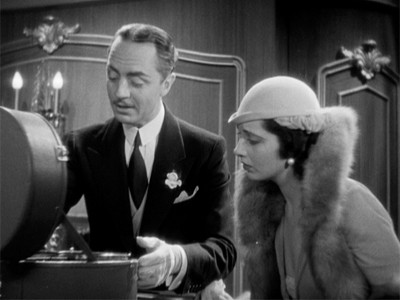
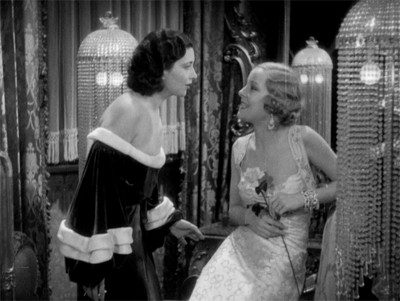
Lawyer Man (1932; 72 minutes)
William Powell is back in Lawyer Man, a tidy little melodrama which amazes with the sheer amount of story packed into a brisk 72 minutes. At film's open, Powell's Anton Adam is seen as an idealistic lawyer practicing in a bustling, heavily Jewish city slum. A successful case involving a racketeer named Gilmurry (David Landau) brings him to the attention of prominent New York lawyer Granville Bentley (Alan Dinehart), who seduces Adam into joining his firm. Although Adam's faithful secretary, Olga (Joan Blondell), isn't as impressed with the powerful clientele this new setting brings, she comes along as well. His first client, a hotsy-totsy blonde (Claire Dodd), approaches him with a breach of promise suit which turns out to be a ploy orchestrated by the woman and Gilmurry to ruin Adam. The wounded but much more defiant Adam vows to return by playing as dirty as the political machine that helped destroy his practice. Meanwhile, even with the intrusion of Bentley's flirtatious sister (Helen Vinson), Olga stays by Adam's side. The salty Olga doesn't let the matter slide, however, cautioning Adam that a previous employer of hers "left the dames alone" and that created a lot fewer headaches.
A fast-paced legal drama with gangsters, gams (that's the Pre-Code part), and swanky nightclubs galore, Lawyer Man isn't especially outstanding, but it's a whole lot of fun. It has that typical Warner Bros. Depression-era verve, with a script full of peppery if typical dialogue of the day (Powell's character actually says "listen, you mugs" at one point). Powell is his usual suave self in a decent performance, and Joan Blondell brings loads of her tradmark sass to the proceedings. She also shares an amusing bit with an unknown Sterling Holloway as a fellow who would be billed as "Olga's gay friend" in a more permissive age. Another interesting aspect of this film is the use of popular songs of the time to comment on the action: "Let's Put Out The Lights And Go To Sleep" is playing during a nightclub scene where Adam is being double crossed, and another pivotal scene with Adam is scored with "I Guess I'll Have To Change My Plan."
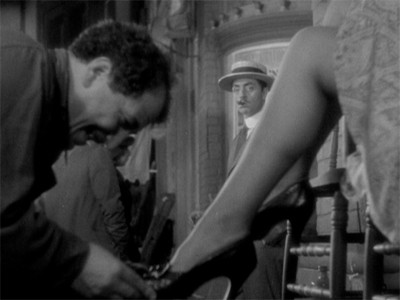
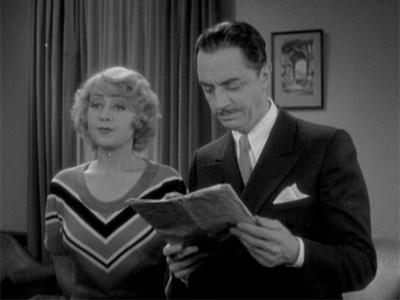
Man Wanted (1932; 62 minutes)
The sleekly executed gender-reversed Cinderella story Man Wanted serves as yet another stylish vehicle for Kay Francis, which along with this set's Jewel Robbery counts as two of the seven, count 'em, seven films she starred in throughout 1932. Here she is the height of working-gal elegance as Lois Ames, a magazine editor who is busy enough to require several assistants in her Art Deco palace of an office. Although Lois is a competent, sympathetic boss, her constant workload causes distress for her secretary, Miss Harper (Elizabeth Patterson, the prickly character actress recognizable to I Love Lucy fans). Miss Harper's letter of resignation comes oddly timed to the arrival at the office of a fresh-faced sporting goods salesman, Tom Sherman (David Manners), who attempts to get Lois to try a rowing machine. Seeing the situation at hand, he instead offers himself for hire as her secretary. The new arrangement sits fine with Lois' layabout, polo-playing husband Fred (Kenneth Thompson) and Tom's goofy roommate Andy (Andy Devine). Tom's catty fiancee Ruth (Una Merkel), however, takes an immediate dislike to Lois. Her feelings intensify as Tom devotes more time to the office. As Tom gradually finds himself romantically attracted to Lois, she keeps him at arm's length - until she finds out that her husband is stepping out with a hosty-totsy blonde (Claire Dodd), that is.
Another good vehicle for the ever-fashionable Francis, Man Wanted has a bit of fun with its unconventional leading couple. Even by 1930s actress standards, Kay Francis was quite unusual with her widow's peak, Elmer Fudd-like speech impediment and large, luminous eyes. The camera adored her, however, and she's never more well-captured than with Gregg Toland's camerawork in Man Wanted. It's interesting here to see the mannish Kay paired off with David Manners, a bland yet appealingly handsome actor with a softer, more vulnerable look than many of the alpha-men that would come about later in the '30s. The Breen Office didn't make sexually ambiguous movie stars go away, but Man Wanted demonstrates some of the subtlety that got lost when the Code went into effect. It's a delightful film with some funny, energetic support from Una Merkel and Andy Devine.
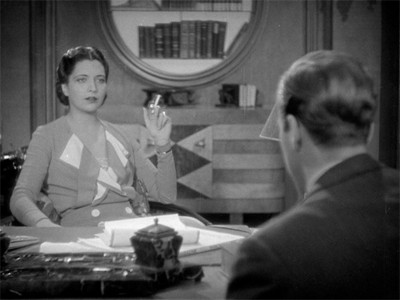
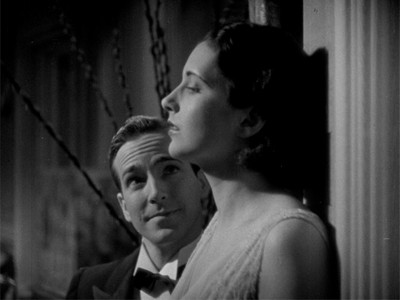
They Call It Sin (1932; 69 minutes)
David Manners returns in They Call It Sin, but the main attraction here is Loretta Young in one of her early, dewy fresh roles as a wayward Midwestern lass who gets wrongly branded as a bad girl. Manners' Jimmy Decker is a New York businessman with a fiancee (Helen Vinson, again) who meets-cute with Young's character, Marion Cullen, on a business trip in her quaint hometown. After Jimmy goes back to the city, Marion - expelled from her childhood home - takes a train to New York to find the man she fell for. Discovering that he's about to wed another, a disillusioned Marion turns to showbiz instead, befriending a vivacious, cartwheeling dancer named Dixie Dare (sprightly Una Merkel). The two manage to land a spot in a show produced by Ford Humphries (Louis Calhern), a suave but sleazy guy who has other designs on Loretta. Marion's getting chummy with Ford brings her back to the attentions of Jimmy, but it's only a series of entanglements which conveniently involve Jimmy's doctor pal Tony Travers (George Brent) which will ultimately settle whether Marion and Jimmy are fated to be together.
They Call It Sin is another fun, fast-paced romp, albeit one whose pleasures are at a lower level than the other three flicks in this set. The most "Pre-Code" the film gets is the salacious title and the mere idea that Loretta Young's character is a wanton woman of shame. She isn't, of course, and the peccadilloes she gets involved in seem rather tame (and forgettable) by today's standards. That doesn't keep it from being an enjoyable film, however. Manners, Brent and Calhern all do a decent job, while the radiant Young delivers a good performance with Merkel contributing some solidly funny support. As the only film here not directed by William Dieterlie (the obscure Thornton Freeland handles the reigns here), the film is a little more clunky and unsure of its footing, however.
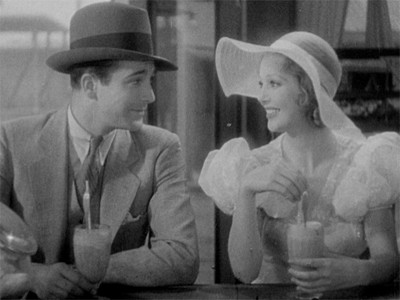
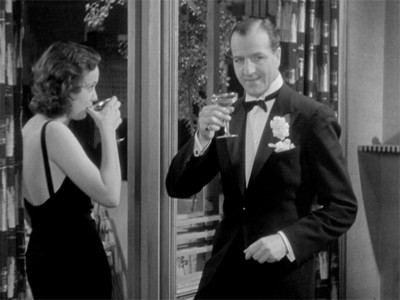
The DVDs:
The four discs of Forbidden Hollywood, Volume 4 come in a standard-width DVD case, which is normal for Warner Archive releases but a slight comedown from the more elaborate fold-out packages on the first three Forbidden Hollywood sets.
Video:
Decent-looking prints are supplied on all four films, none of which have been digitally cleaned up. Better than public domain, at least. The persistent white specks, vertical lines, dust and scratches generally don't deter the viewing experience. Man Wanted appears to be the best-preserved of the bunch.
Audio:
These are all in fabulous mono with no subtitles, for a somewhat ragged but serviceable aural experience (Lawyer Man does sport one scene that contains a consistent, annoying background tone, however).
Extras:
Original theatrical trailers are supplied for all of the films except for They Call It Sin. The package back contains four tiny movie posters which begged to be printed larger as postcards (maybe Warner Archives can somehow include them in the future?).
Final Thoughts:
Gritty, jazzy, slightly naughty and a whole lot of fun, the quartet of brisk Pre-Code offerings on Forbidden Hollywood, Volume 4 offer a good portrait of the Warner Bros. studio in 1932. Three of the films are terrific, the fourth more routine but still worthwhile, which makes it a good bet for Pre-Code fans (especially if you like William Powell and the beguiling Kay Francis). Recommended.
Matt Hinrichs is a designer, artist, film critic and jack-of-all-trades in Phoenix, Arizona. Since 2000, he has been blogging at Scrubbles.net. 4 Color Cowboy is his repository of Western-kitsch imagery, while other films he's experienced are logged at Letterboxd. He also welcomes friends on Twitter @4colorcowboy.
|
| Popular Reviews |
| Sponsored Links |
|
|
| Sponsored Links |
|
|
| Release List | Reviews | Shop | Newsletter | Forum | DVD Giveaways | Blu-Ray | Advertise |
|
Copyright 2024 DVDTalk.com All Rights Reserved. Legal Info, Privacy Policy, Terms of Use,
Manage Preferences,
Your Privacy Choices | |||||||












